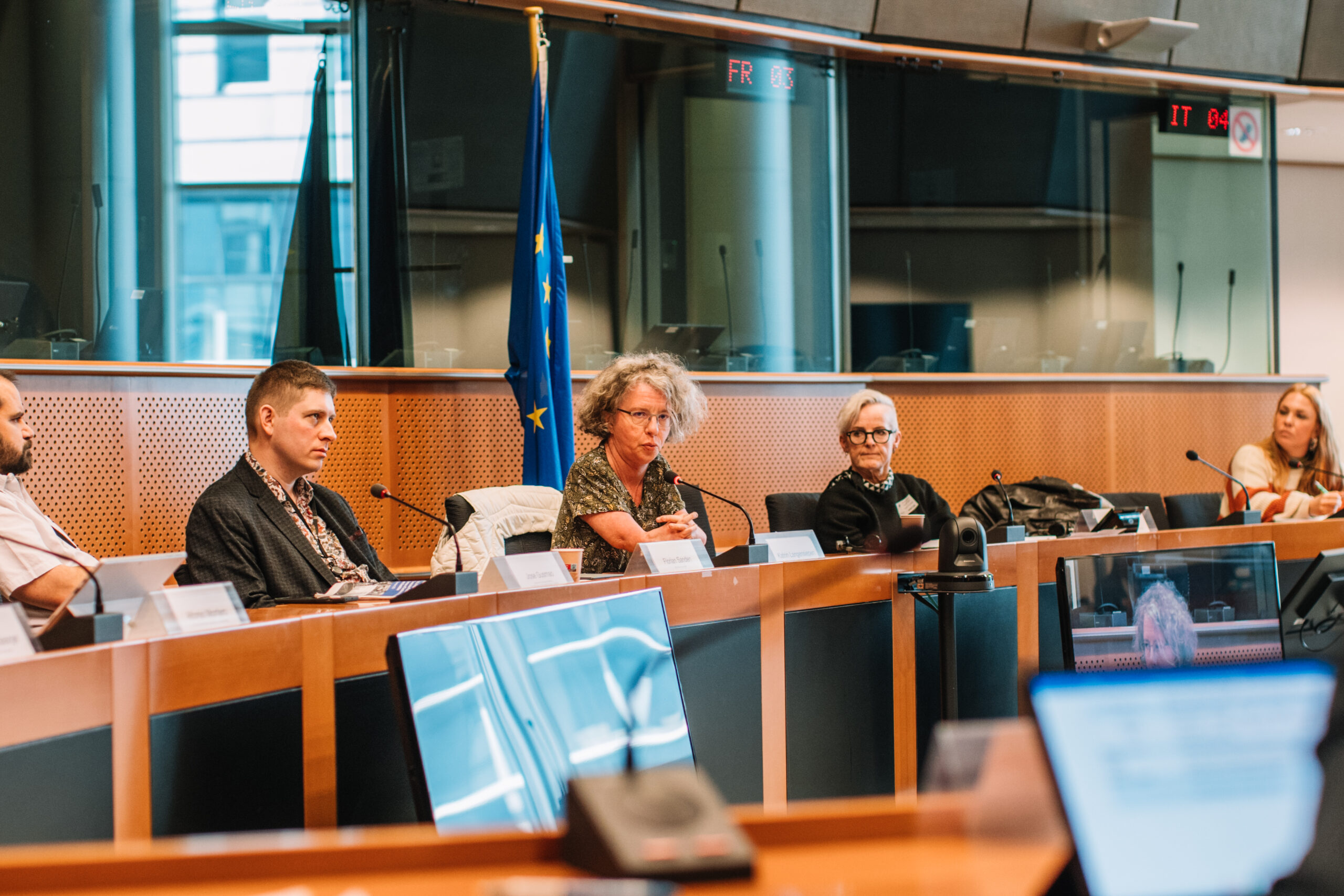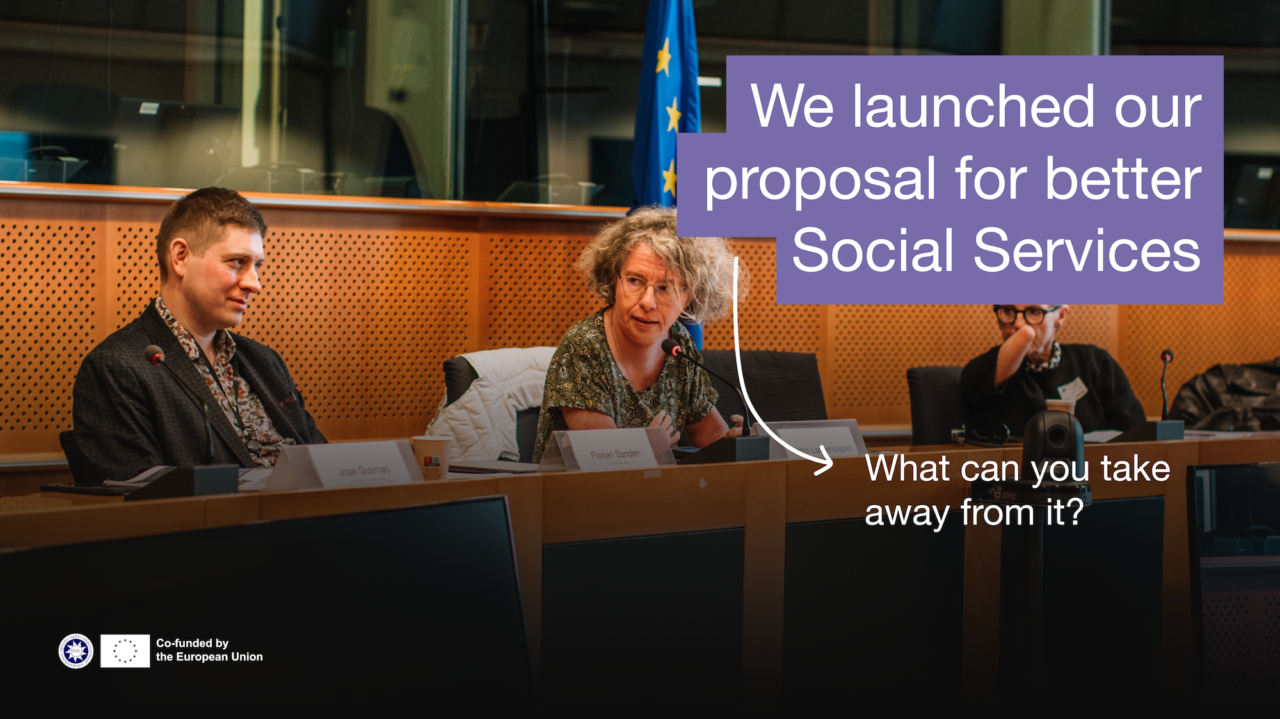On April 9th 2024, ENIL launched its Proposal for the European Commission’s Framework for Social Services of Excellence for Persons with Disabilities. The Proposal, which was published by ENIL earlier this year, aims at presenting the views, ideas and needs of disabled people on quality social services ahead of the development of the Framework by the Commission, which is due to happen by this year.
ENIL’s Proposal revolves around 5 key themes:
- The human rights model of disability;
- Peer support;
- Co-production;
- Availability, accessibility, acceptability, affordability and adaptability of services;
- Intersectionality
All of these topics were at the centre of the debate during the launch event, which took place at the European Parliament and was attended by several participants, including representatives of NGOs and Members of the Parliament.
The conference was hosted by MEP Katrin Langensiepen, from the Group of Greens/European Free Alliance, who is currently also the only disabled woman in the Parliament.




Opening the event, Langensiepen spoke of social services as a condition for an inclusive society, and explained how in countries like Poland and the Czech Republic a lack of support to personal assistance by the State results in family members, and mothers in particular, being the primary source of assistance for persons with disabilities.
The MEP further pointed to some factors preventing people with disabilities from accessing social services that enable them to fully enjoy their rights, including funding, regulations, and power imbalance. In light of this, she stated that Member States must be supported but also held accountable, and that the EU needs to push them to enhance social services and comply with the UNCRPD.
Ms. Langensiepen’s speech was followed by presentations of good practice examples in two of the key areas proposed by ENIL, namely peer support and co-production.
Emm Astrand, Coordinator International Contacts and Project Manager at Swedish organisation STIL, a personal assistance cooperative based on peer support, talked about the reality of Independent Living.
Mrs. Astrand described the importance of peer support in developing independent living skills and attitudes among persons with disabilities. Through the sharing of personal experience, STIL’s Independent Living project changed the lives of the disabled people it involves.
Tara Flood then presented the unique co-production experience of the London Borough of Hammersmith and Fulham. In explaining the Borough’s decision to commit to co-production in 2017, Ms. Flood highlighted how it was developed after years of demands for rights enjoyment and independent living by disabled people. Ongoing activism was a key point in her speech, which she ended by emphasising its importance for change: “Stay focused on nothing about us without us”, she encouraged the audience.
Mrs. Flood also spoke about power sharing, a central aspect of co-production, and the difficulties it entails, as it requires authorities to give up part of their power to involve citizens in the design, planning, and implementation of services. She explained how realizing power sharing and co-production take a long time and a lot of work for people to be convinced, but she claimed she feels the Borough is on the right track.
As reported by Mrs. Flood, co-production led to a shared vision and sense of trust with residents, and a higher involvement of persons with disabilities. It also constitutes a cost-effective model, as the services developed are actually wanted and used by persons with disabilities.
Following the good practices presentation, ENIL Policy Officer Florian Sanden took the stage. He briefly introduced the Proposal in the context of EU policy, explaining its correlation to the European Strategy on the Rights of Persons with Disabilities 2021-2030 alongside ENIL’s Proposal to the Commission Guidance on Independent Living, which was launched in 2023.
He then further delved into the key concepts guiding the Proposal. In light of the social model of disability, social services are supposed to overcome barriers, not impairments. Two effective ways to enhance this ourcome are peer support and co-production, which both entail the involvement of disabled persons themselves, instead of non-disabled professionals only, in all stages of service delivery. Furthermore, it is essential to consider intersectionality, intended as the coexistence and interaction of various dimensions of a person’s identity, such as gender, race, ethnicity immigration status, cultural background etc.
Finally, in line with the Proposal, Mr. Sanden argued that, due to a number of reasons, services do not always work as they are supposed to or as they were presented by authorities, resulting in a lack of support for persons with disabilities. Furthermore, disability assessment procedures, which are a precondition to access services, are often not transparent and fair.
In response to the previous speeches, Nora Bednarski, from the Cabinet of European Commissioner Helena Dalli, stated that the Proposal and the good practices presented would be inspiring for the Commission’s work on the Framework for Social Services of Excellence for Persons with Disabilities, the last of 7 flagships in the European Strategy on the Rights of Persons with Disabilities 2021-2030.



She then stated that, in the Commission’s view, an overly-specified approach to service delivery can result in segregation; hence, the Framework will be looking at mainstream social services, and how they can be integrated with specialised ones in order to deliver person-centred services. Mrs. Bednarski also recognised the key role of peer support and co-production.
She then talked about the role of the EU, and how, despite its limited competencies on the discussed topics, through leverages it can help taking great steps forward, in cooperation with Member States.
Alfonso Montero, Chief Executive Officer of the European Social Network, focused his speech on how social services need to be person-centred, safe, human rights-based, and community based. Their objective should be a good quality of life for the person, and in order to reach this outcome there needs to be effective management, with an adequately prepared staff and a shared view.
Following Mr. Monteiro’s speech, Konstantina Levanti, Head of Policy of the European Association of Service Providers for Persons with Disabilities, called for quality support services aligned with human principles, that can make it possible for disabled people to live how they want to. In the current reality, however, both the environment and the policies are not enabling the transition to support based on human rights principles, where disabled people can make decisions for themselves. According to Mrs. Levanti, the underfunding of the sector and the lack of flexibility of the funding model are especially big challenges.
In this view, the Framework can facilitate the development of an enabling environment, member States need to be encouraged to take steps in this direction. The EU should support co-production, which is the only way to identify what good services should be like. In order to apply this, examples of good practices are particularly helpful.
Aurélie Baranger, Director of Autism Europe, then gave an insight on the experiences of autistic people and the obstacles they face in terms of social services.
In particular, she highlighted a difficulty in accessing disability recognition, and a tendency of some groups, such as autistic women, to especially encounter barriers in accessing diagnosis, or be misdiagnosed.
According to Autism Europe, in order to better respond to autistic people’s needs services must be developed following the Universal Design principles and must be autistic friendly. Moreover, public funding must be adequate, there needs to be coordination between services, and service providers must be trained appropriately.
Finally, MEP Jose Gusmão described the situation of social services for disabled people in Portugal.
He indicated lack of funding as being a key issue: as the funding is limited, only a limited number of people in need can access services. Additionally, institutions receive much more stable funding than Independent Living Centres, making them a more available and a preferred choice. Prejudices on disability and independent living also hinder the full enjoyment of rights and services by disabled people in Portugal.
Another issue addressed by Mr. Gusmão is the participation model, where persons with disabilities are not fully involved in the decision-making processes.
Finally, he pointed out the problems connected to the Portuguese disability assessment procedures, in which assessments are made in line with the restricted funding planned for disability policies, and the objective is to “make both ends meet”, resulting in a large number of persons not being able to access the recognition and support they need.
The Launch Event was concluded by a brief discussion. Participants described their experiences from various country and disability perspectives. A final remark was made on the importance of disabled people’s organisations, and on the need for a broader approach, in which disability inclusion and accessibility are at the back of the mind on any issue.



